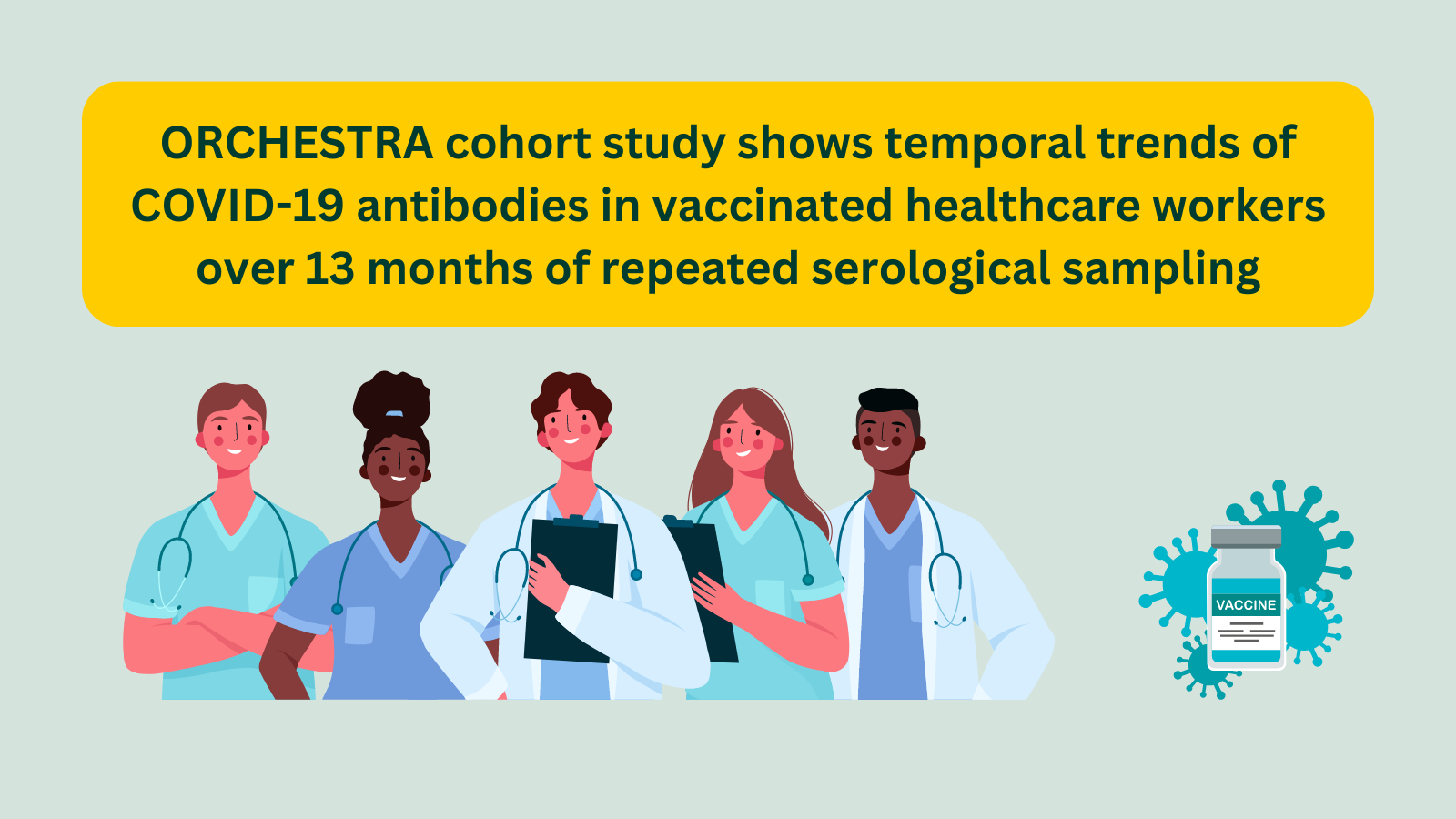ORCHESTRA cohort study shows temporal trends of COVID-19 antibodies in vaccinated healthcare workers over 13 months of repeated serological sampling

ORCHESTRA cohort study shows temporal trends of COVID-19 antibodies in vaccinated healthcare workers over 13 months of repeated serological sampling
“Temporal trends of COVID-19 antibodies in vaccinated healthcare workers undergoing repeated serological sampling: An individual-level analysis within 13 months in the ORCHESTRA cohort” is a study conducted within Work Package 5 (WP5), which is led by Prof. Paolo Bofetta, Department of Medical and Surgical Sciences, University of Bologna. Answers gave his team Mahsa Abedini, Giulia Collatuzzo, Giorgia Ditano, Ludovica Leomanni, Marika D’Agostini, Shuffield Seyram Asafo and Adelajda Matuka.
https://doi.org/10.3389/fimmu.2022.1079884
What is the specific research question and what did you look at?
We investigated changes in serologic measurements for healthcare workers (HCWs) with two (2) measurements after COVID-19 vaccination. Our aim was to examine these differences for HCWs and vaccine characteristics, including age, sex, study center, previous COVID-19 infection, number of doses, and type of vaccine within 13 months. We achieved this by fitting a multiple linear regression (MLR) to the data. By using this method, we were able to analyze the data and see if any of these factors were related to how much the blood test results changed after vaccination.
How many cases from how many cohorts did you evaluate (if this is applicable)?
This study comprises 19,923 HCW from Italy (Bari, Bologna, Brescia, Trieste, and Verona), Spain (Northern Metropolitan Area of Barcelona (Barcelona) and Oviedo), Romania (multicentric), and Slovakia (multicentric).
How long did it take to get results?
It took around 2 – 4 weeks to produce the results after receiving the data from cohorts.
What are the results/answers?
The study found that there was a smaller difference in the level of antibodies in the blood between the first and second blood tests taken within 7-8 months of vaccination, compared to the difference between the first and second blood tests taken within 30 days of vaccination.
The study also found that older people had more differences in antibody levels than younger people. Healthcare workers who had been previously infected with COVID-19 had a greater difference in antibody levels between the two blood tests than healthcare workers who had not been previously infected.
The study also found that the longer the time between the first vaccine dose and the first blood test, and the longer the time between the two blood tests, the higher the risk of having a greater difference in antibody levels.
The first blood test was also found to be a good predictor of how much antibody levels would decline in the future. In addition, the study also compared the level of antibody decline in people who received different COVID-19 vaccines and found that people who received the Spikevax or mixed vaccines had a smaller decline in antibody levels than people who received the Comirnaty vaccine.
Was there anything unexpected/surprising that you found?
There are a few remarkable findings. Firstly, the finding that the difference in serologic levels decreases from less than 30 days to 210-240 days after vaccination is remarkable, as it suggests that the protective antibodies generated by the vaccine may not decline as rapidly as previously thought.
The association between age and an increased difference in serologic levels is also remarkable, as it suggests that older people may have a weaker immune response to the vaccine compared to younger people.
The finding that healthcare workers who had previously been infected with COVID-19 had a greater difference in antibody levels between the two blood tests than healthcare workers who had not been infected before is also remarkable.
Finally, the finding that people who received the Spikevax or mixed vaccines had a smaller decrease in antibody levels than people who received the Comirnaty vaccine is remarkable, as it suggests that different vaccines may have different levels of effectiveness in generating and maintaining protective antibodies.
Who (which group of the population) benefits from your research?
Healthcare workers, decisionmakers and the public can benefit from the results. Knowledge about different antibody responses allow informed decision in terms of vaccination efficacy, scheduling and booster doses.
What are your recommendations?
We recommend further analysis on trends examining changes in serological measurement for HCWs with more than three measurements.
Which ORCHESTRA partners are involved?
Italy (Bari, Bologna, Brescia, Trieste, and Verona), Spain (Northern Metropolitan Area of Barcelona (Barcelona) and Oviedo), Romania (multicentric), and Slovakia (multicentric).
Press contact:
Marlene Nunnendorf
ORCHESTRA Science Communication Officer
Email: marlene.nunnendorf@orchestra-cohort.eu
###